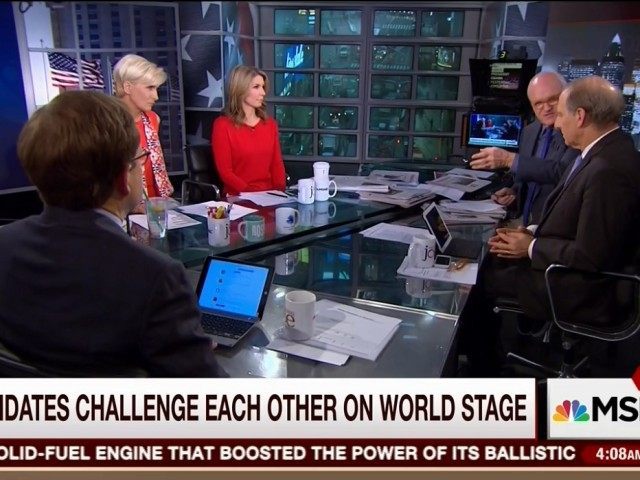Thursday on MSNBC’s “Morning Joe,” the show’s panel made up of the Aspen Institute’s Walter Isaacson, the Council on Foreign Relations Richard Haass, former McCain and Bush strategist Nicolle Wallace, former RNC chairman Michael Steele, former Obama “car czar” Steve Rattner and co-hosts Mika Brzezinski and Mike Barnicle reacted to GOP presidential front-runner Donald Trump’s claim a day earlier that NATO is obsolete.
According to Isaacson, NATO should be “reconfigured” to take on the threat of terrorism.
“I was listening to Richard Haass say that it’s been this great experiment, which it has been for almost 70 years now where you have NATO, the United States and North Atlantic Alliance and that really has been a cornerstone of keeping safety in this world,” Isaacson said. “The one thing I would say though is that NATO was designed to really stop the spread of Soviet or Russian spread of communism through Europe. It’s got to be reconfigured now to do intelligence sharing and be an anti-terrorist organization of North America and Europe. And if you’re going to have, as David Ignatius said in his column recently, this bad problem with intelligence sharing after that leads to things like the Brussels attack, maybe that’s what NATO should take the lead in doing – is becoming an anti-terrorist organization much more than it is now.”
Haass argued NATO still has a useful role in the world, but acknowledged it has to change.
“We’ve had a coordinated system of military cooperation for 50 years,” Haass said. “It’s called NATO. That’s the mechanism. You have countries essentially pooling capabilities, whether they’re intelligence capabilities, military capabilities … We coordinated against the Soviet Union for four decades. It was called a successful pursuit of the Cold War. One threat we obviously now have terrorism, we have this threat out of area, how to try to add stability to the Middle East. Look, it’s right – NATO has to change. The whole idea of NATO was to keep the Americans in Europe, the Germans down, the Russians out. We still don’t have a challenge with the Russians. NATO, if anything, has gone down too far. We’ve gone from 300,000 to 30,000 troops. We have to build up against a renewed Russian challenge. We have to get the Europeans not just to do more but coordinate more. The problem is, the Europeans spend all this on defense but no one specializes so the whole is less than the sum of its parts. The Europeans are not coordinating enough.”
Rattner went on to point out that the European members of NATO don’t spend as much on defense as the United States.
“But to Trump’s point — and I can’t believe I’m saying those words — the Europeans do spend less than we do as a percent of their budget, except the Brits,” Rattner added.
Haass maintained the presence of NATO reinforces the United States’ interests in Europe, which he argued still exist despite the end of the Cold War.
“What’s more important is how they spend it as low as it is,” he said. “The fact that you have these countries replicating one another and don’t have countries doing a division of labor so the whole makes more sense, that’s the problem. But one other thing about NATO very quickly. The United States has been a member of NATO not as a favor to the Europeans. We do it as a favor to ourselves. The whole lesson of the 20th century was the United States had a vital national interest in the stability and balance of power in Europe. I don’t think that interest has disappeared. We are there in NATO not as a favor but something out of American vital national interest.”
Haass said he didn’t believe NATO was obsolete and noted it was there to take on any perceived threat from Russia, with terrorism and it was functioning in Afghanistan.
“NATO has adapted,” he said. “It’s a different threat than it had during the Cold War. But NATO still has a real purpose.”
Wallace directed a question at Steele about Trump’s statement, describing it as maddening because states a “kernel of ingrained truth,” but he adds a statement that she called “over the top,” about as to whether or not it was something Trump could fix before Election Day.
“I think he can,” Steele replied. “I think we saw a glimmer of the effort to frame a presidential general election campaign when he appeared at AIPAC. You know, he had the discipline to use teleprompters, he criticized the president for it and then there he was. He had a beginning and a middle and end of a thought or idea as vague as it may have been at times on Israel to begin to frame an argument. And I think on the NATO piece I think that there is a kernel of truth behind what he’s saying. Take the money out of it and think about the organization and structure. What is its role in the 21st century, in an asymmetrical war against ISIS and can NATO – and I think Dr. Isaacson’s point is the critical one, can it be reshaped to do the things it did in a Cold War era, yeah to the extend we have to deal with Russia but make it more flexible and I think that’s where Donald Trump wants to get to.”
Follow Jeff Poor on Twitter @jeff_poor

COMMENTS
Please let us know if you're having issues with commenting.